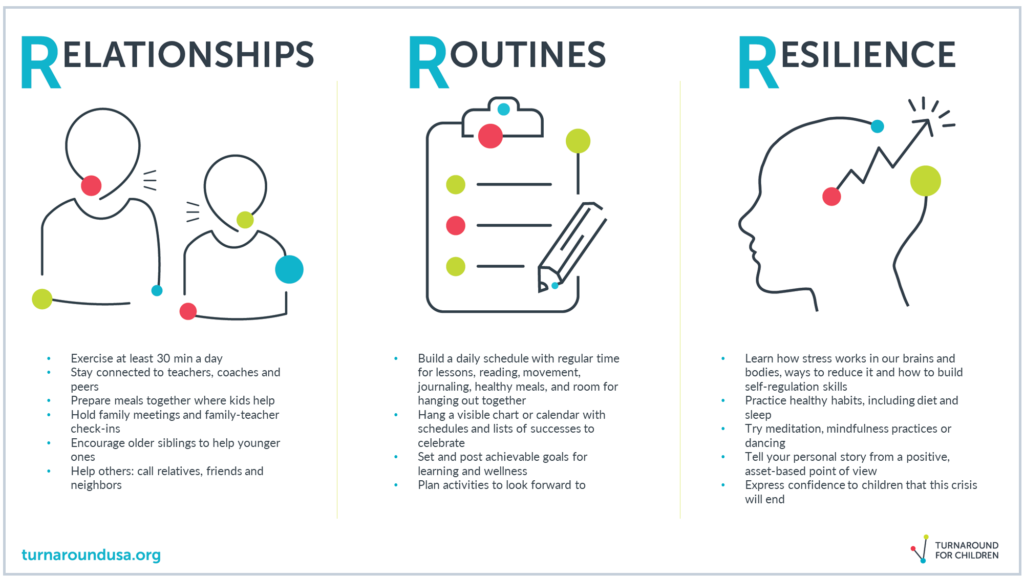The New Three Rs: Helping Children Thrive During The Pandemic and Beyond
Visit Turnaround’s Three Rs resources page to download tools aligned to this article.
By Pamela Cantor, M.D. and Kate Felsen
We call it the COVID-19 paradox. To stay safe and keep others safe from this insidious virus, we must practice physical distancing. But the very thing that keeps us from catching COVID threatens the connections that help us feel safe, manage stress, and grow and learn.
We are all experiencing disruptions to some of the most important communities and relationships in our lives – friends, classrooms, teachers, teams, coaches, churches, extended families – the people we trust the most. The people we count on to help us get to the other side of this crisis and build resilience for whatever the future may hold.
So what can we do about this? We can make our homes and eventually our schools places that inoculate us and our children against the intolerable stress of the scary, uncertain world we now live in. How? By focusing on the Three Rs: relationships, routines and resilience.
RELATIONSHIPS
Let’s start with ideas for strengthening and maintaining relationships at home. Relationships are the “active ingredient” in any environment – classrooms included –because they boost oxytocin – the love/trust hormone – and activate the learning centers of the brain. In fact, trust is the antidote to stress and relationships are the medium through which we experience trust.
- Exercise together for at least 30 min a day – running, walking, dancing, all rhythmic activities calm the brain
- Schedule one-on-one conversations with teachers, coaches and advisory groups so children stay connected to their teachers, coaches and peers
- Prepare meals together where kids help choose the menu or even do the cooking themselves
- Hold family meetings and family-teacher check-ins to gauge how everyone is doing and answer questions about COVID-19
- Encourage older siblings to help younger ones with homework and household chores
- Call relatives, friends and neighbors who may be alone – helping others promotes the release of neurochemicals that boost the immune system
ROUTINES
Routines are something we have some control over in this uncertain time and can make our home environments feel safer and calmer. Our brains are prediction machines that like order and knowing what is coming next. When our environments are orderly the brain is calmer and able to learn.
- Build a daily schedule with your kids that includes regular time for lessons, reading, movement, journaling, healthy meals, and room for hanging out together
- Make or hang a visible chart or calendar with schedules and lists of successes to celebrate
- Set and post achievable goals for learning and wellness
- Plan activities to look forward to – such as playing cards, Twister or music, maybe over zoom with a classmate, or a hike with friends – six feet apart
RESILIENCE
Building resilience is likely the most important task we have, for ourselves and our kids. You might think that resilience is something you have or you don’t, like eye color, but resilience can be built just like a muscle. And it starts with knowing the strengths we already have from our life experiences and bolstering the skills and mindsets we possess to regulate our emotions, our actions, our behavior. We can do this through co-regulation in activities with others. Think of soothing a crying child, running or walking side-by-side, or coaching a teenager to prepare for a test.
- Turn to credible resources to learn how stress works in our brains and bodies, ways to reduce it and how to build self-regulation skills
- Choose and practice healthy habits, including a well-balanced diet, at least 8 hours of sleep, and regular exercise
- Limit exposure to media – and use the time to call a friend or relative
- Try meditation, mindfulness practices or dancing, walking or throwing a ball to a repetitive beat
- Re-write and tell your personal story from a positive, asset-based point of view – be the change you want to see
- Express confidence to children that this crisis will end, knowing that we must work at managing ourselves and our fears and frustrations every single day
We don’t know when schools will reopen. And until we have a vaccine for this coronavirus, or a cure, it is likely that many children will move between home and school for some time to come. This means learning has to move with the learner, wherever that learner may be. All the more reason for adults to learn how they can design calm, safe, supportive environments for children.
Settings that prioritize the Three Rs are like an ecological vaccine, rich in protective factors that ignite the developing brain, promote wellness, and protect children from the damaging effects of stress all at the same time. These are the places where kids can develop the complex skill development and deeper learning skills to tackle a thorny word problem, write a critical essay or imagine a practical solution to one of the many challenges in front of us today.


Share This Story